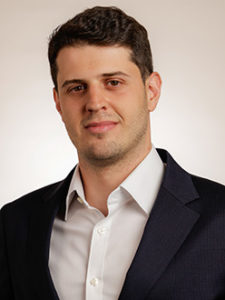 The Department of Mechanical Engineering is excited to welcome Dr. Alex Novoselov as an assistant professor this fall. Dr. Novoselov is originally from New York City, where he attended The Cooper Union and received his B.E. in Mechanical Engineering. He received both his M.A. and Ph.D. in the Department of Mechanical and Aerospace Engineering at Princeton University before moving to Switzerland to work as a Postdoctoral Scholar in the Department of Mechanical and Process Engineering at ETH Zürich.
The Department of Mechanical Engineering is excited to welcome Dr. Alex Novoselov as an assistant professor this fall. Dr. Novoselov is originally from New York City, where he attended The Cooper Union and received his B.E. in Mechanical Engineering. He received both his M.A. and Ph.D. in the Department of Mechanical and Aerospace Engineering at Princeton University before moving to Switzerland to work as a Postdoctoral Scholar in the Department of Mechanical and Process Engineering at ETH Zürich.
Novoselov’s research uses computational tools to study problems involving flow and energy with the goal of combating climate change. His focus has been on turbulent reacting flows, which are complex, multi-physics problems involving the coupling of turbulence with chemistry. He has studied these problems from an applied perspective to better understand systems like gas turbines, as well as from a fundamental perspective to improve and develop new computational fluid dynamics models that ultimately allow for simulation of applied systems.
Currently, Novoselov is studying the use of hydrogen as a fuel in gas turbines. Burning hydrogen produces no carbon dioxide emissions making cleanly produced hydrogen an appealing candidate for carbon emission-free energy. However, replacing common fuels like natural gas with hydrogen leads to significant operational challenges due to higher diffusivities and reactivities. Destructive phenomena like boundary layer flashback, wherein a flame propagates along the wall into thermally unshielded regions of a gas turbine, need to be suppressed for successful use of hydrogen in these applications. Novoselov’s work focuses on understanding the fundamental physics leading to such phenomena, as well as developing models to help predict their onset when burning hydrogen.
“I am excited to work with students and faculty at the U who have similar interests and goals” said Novoselov. “I believe that there is strong potential for collaborations that can lead to significant advances in the fight against climate change.”
You can visit the Numerical Turbulence, Energy, and Reactions Group website to learn more.